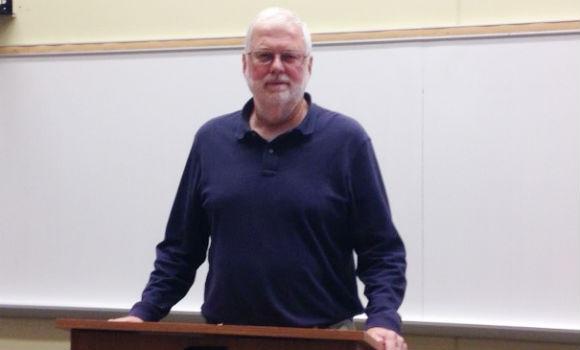
Herb Hinkle
Herb Hinkle ’74, adjunct professor, Rutgers Law benefactor, and advocate for the elderly and disabled
Fresh out of Rutgers Law School in 1974, a summer job in the New Jersey Public Defender’s Office in Camden led Herb Hinkle to a more than 40-year career fighting for the rights of people with disabilities.
When the Public Defender’s Office expanded to become the Department of the Public Advocate in the mid-1970s, Hinkle was initially hired to represent people with mental illness. Two years later, he helped to create a new unit that represented people with developmental disabilities such as autism and mental retardation.
“I had an interest in learning more about the mental health system from the public defender’s point of view, so that led to investigating how the system works and who was involved with it,” said Hinkle, RLAW’74, and an adjunct professor at Rutgers Law teaching courses in elder law and estates and trusts.
After leading the public advocate’s developmental disabilities office for nearly a decade, he went into private practice. He is the founding partner of Hinkle, Fingles, Prior & Fischer in Lawrenceville. The firm represents people with disabilities, as well as clients who have a family member with a disability. The firm, which grew to include six offices in New Jersey and Pennsylvania, helps clients obtain services from school districts and adult programs, as well as with estate planning.
Since 2010, Hinkle has been teaching a course at Rutgers Law School in Camden. This semester, he’s teaching a course on elder law, covering issues such as the ethical dilemmas of representing multiple generations within a family, surrogate decision-making, guardianship, power of attorney, living wills, Medicare, and Medicaid.
Retired since 2015, Hinkle now lives in Florida and comes to campus every week to teach a three-hour-long class.
“I get excited on Sunday when it is time to drive to the airport and to come here to teach,” said Hinkle. “I find it both stimulating and fun. I love the people at Rutgers. I love all the students. I love that there’s a lot of student participation, and I think the students seem to enjoy and get something out of what they are learning.”
In his classes, students have the opportunity to work on some legal projects based on issues in popular culture, such as the issue of inheritance rights from the historical period drama television series, “Downton Abbey.” Students have written about inheritance rights in England from the early 20th century based on the show, in which a member of the aristocracy had three daughters, so his title and the money that belonged to his American wife would all go to his closest male heirs, which were several degrees removed from his daughters.
Sometimes, Hinkle has asked his students to summarize their papers in a Haiku poem’s 5-7-5 syllable structure.
“We had good times with trying to convey ideas in a few words,” said Hinkle. “It’s a good talent if you’re a lawyer trying a case and you have a tag line.”
In every class, Hinkle has a special treat for the students halfway through the three-hour class. He offers sweets such as Snickers candy bars and Blow Pops, a lollipop that has bubblegum in the center.
“After the break I always give them candy,” said Hinkle. “I want them to get a sugar high in the middle of the class.”
Students enjoy his classes so much that they selected him as the “Adjunct Professor of the Year” in 2013 and 2016.
“I’m easy-going just as long as they are doing the work,” said Hinkle.
Hinkle’s influence at Rutgers Law School extends beyond the classroom. In 2015, he and his wife Patricia, a 1978 Douglass College alum, pledged $2 million to Rutgers Law School to create an endowment that provides scholarships for law students and offers stipends for students working in public interest endeavors.
A Camden native, Hinkle was very young when his father died. He and his mother struggled financially, but he graduated from Drexel University and then enrolled at Rutgers Law School.
“The cost of Rutgers law school was very affordable, and made it possible for me to go to law school,” said Hinkle. “I think I received a good education and everything worked out well.”
Hinkle is humble about his generosity, his teaching and mentoring law students, and leadership in pro bono projects at Rutgers Law. He helped establish the Planning Estates Pro Bono (PEP) program in which he works with students to prepare end of life documents for low-income senior citizens.
Hinkle views his contributions to the Law School, as a way to show his appreciation for the opportunities his education and association with the Law School have afforded him.
“I wouldn’t have had a law career without Rutgers,” said Hinkle.